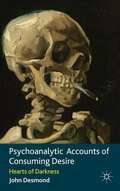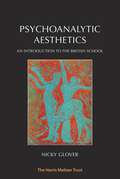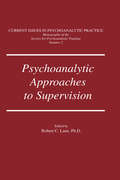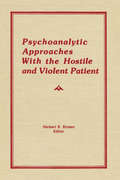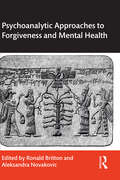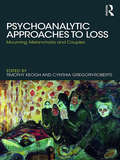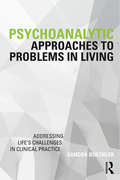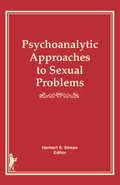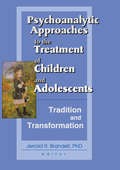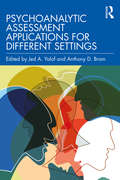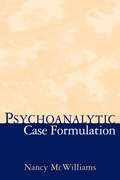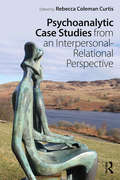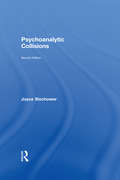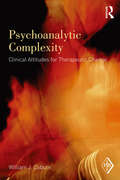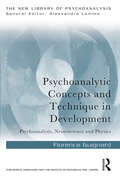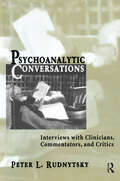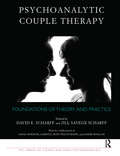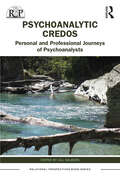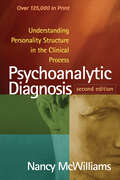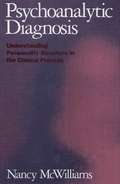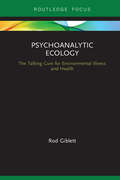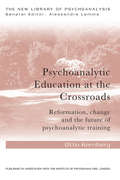- Table View
- List View
Psychoanalytic Accounts of Consuming Desire
by John DesmondProvides an accessible introduction to psychoanalytic explanations of consumer desire. Topics are drawn widely to reflect the scope of Freud's vision and include dreams, sexuality and hysteria. Discussion is widened to selectively include authors such as Melanie Klein and Jacques Lacan, and to include evaluation of current research.
Psychoanalytic Aesthetics: An Introduction to the British School
by Nicky GloverThis is a book to which the attention of students of art theory and criticism, and all those interested in the important application of psychoanalysis to other fields of study, should be drawn. Psychoanalytic Aesthetics rethinks the classical account of the relation between art and madness, creativity and psychoneurosis, and the distinction between the primary and secondary processes. It covers a great deal of ground and reviews many psychoanalytic writers (predominantly of the British tradition) on aesthetics, as well as many of the aestheticians using a psychoanalytic background. It is well written and there is an impressive grasp of the many writers covered. More than this, the book is also a work of psychoanalytic scholarship, being a masterly overview of psychoanalytic schools of thought, and an in-depth study of the British object-relations schools. It amply achieves its overriding goal to demonstrate that the work of the British School presents a significant contribution to psychoanalytic aesthetics and criticism, updating Freud, Kris and the classical contributions to the field. It is therefore potentially a very useful source book for future scholars of both psychoanalysis and of aesthetics.
Psychoanalytic Approaches To Supervision (Current Issues In Psychoanalytic Practice Ser. #Monograph 2)
by Robert C. LaneFirst published in 1991. This monograph is number 2 of the Society for Psychoanalytic Training series and Dr. Lane and his colleagues seek to further understanding of the complexities of the supervisor-supervisee relationship and provide illumination regarding the many different patterns of learning and achieving, as well as blocking and failing.
Psychoanalytic Approaches With the Hostile and Violent Patient
by Herbert S StreanProvides practicing psychotherapists with opportunities to think about and explore the issues and feelings involved in working with violent or potentially violent people.
Psychoanalytic Approaches to Forgiveness and Mental Health
by Aleksandra Novakovic Ronald BrittonPsychoanalytic Approaches to Forgiveness and Mental Health considers the role of forgiveness in mental life, concerning both forgiving and being forgiven. Each chapter addresses concepts including superego, repetition compulsion, enactment, and notions such as sacrifice, penance, justification, absolution, and contrition. The contributors consider both their professional and clinical experience and their ethical, cultural, or philosophical background when considering aspects of forgiveness and its impact on clinical practice. The book is an attempt to open the subject of forgiveness, not to reach ethical conclusions nor to formulate pious psychological behavioural axioms. It also considers the weight of feeling unforgiven and of holding the lifelong resentment or vengeful wishes of the unforgiving. Psychoanalytic Approaches to Forgiveness and Mental Health will be key reading for psychoanalysts and psychotherapists in practice and in training and for other professionals interested in the role of forgiveness in mental life. It will also be of interest to academics and students of psychoanalytic studies, philosophy and spirituality.
Psychoanalytic Approaches to Loss: Mourning, Melancholia and Couples
by Timothy Keogh Cynthia Gregory-RobertsPsychoanalytic Approaches to Loss: Mourning, Melancholia and Couples applies psychoanalytic ideas to the clinically complex issue of loss in couples and families and outlines a new model for the treatment of associated unresolved grief. In line with contemporary approaches to couple and family psychoanalysis, this integrated object relations and link theory model provides a clear framework and approach for assessing and treating this clinical presentation. The book brings together contributions from internationally known and respected clinicians and authors who focus on loss, including repeated pregnancy loss, the loss of a child or parent and the loss of a relationship itself. These psychoanalytic couple therapists take the reader inside their consulting rooms, enabling observation of their approaches to the treatment of couples experiencing loss and associated unresolved grief. Psychoanalytic Approaches to Loss: Mourning, Melancholia and Couples will make an important contribution to the literature on grief and mourning and the application of psychoanalytic thinking to couples presenting with difficulties linked to unresolved grief, following loss. It represents an essential resource to psychotherapists, counsellors, family therapists, mental health professionals and many others supporting those experiencing loss.
Psychoanalytic Approaches to Problems in Living: Addressing Life's Challenges in Clinical Practice
by Sandra BuechlerPsychoanalytic Approaches to Problems in Living examines how psychoanalysts can draw on their training, reading, and clinical experience to help their patients address some of the recurrent challenges of everyday life. Sandra Buechler offers clinicians poetic, psychoanalytic, and experiential approaches to problems, drawing on her personal and clinical experience, as well as ideas from her reading, to confront challenges familiar to us all. Buechler addresses issues including difficulties of mourning, aging, living with uncertainty, finding meaningful work, transcending pride, bearing helplessness, and forgiving life's hardships. For those contemplating a clinical career, and those in its beginning stages, she suggests ways to prepare to face these quandaries in treatment sessions. More experienced practitioners will find echoes of themes that have run through their own clinical and personal life experiences. The chapters demonstrate that insights from a poem can often guide the clinician as well as concepts garnered from psychoanalytic theory and other sources. Buechler puts her questions to T. S. Eliot, Rainer Maria Rilke, Elizabeth Bishop, W. S. Merwin, Stanley Kunitz and many other poets and fiction writers. She "asks" Sharon Olds how to meet emergencies, Erich Fromm how to live vigorously, and Edith Wharton how to age gracefully, and brings their insights to bear as she addresses challenges that make frequent appearances in clinical sessions, and other walks of life. With a final section designed to improve training in the light of her practical findings, Psychoanalytic Approaches to Problems in Living is an essential book for all practicing psychoanalysts and psychoanalytic psychotherapists.
Psychoanalytic Approaches to Sexual Problems
by Herbert S StreanNow you can more effectively help patients suffering from sexual conflict in its various manifestations. As sexuality has “come out of the closet,” people have become more willing to seek professional help in dealing with their sexual conflicts and unhappiness. Several leading authorities demonstrate how sexual conflicts arise--often in early childhood, and provide examples of effective therapeutic approaches for treating patients who experience sexual conflict about homosexuality, extramarital sex, voyeurism, and exhibitionism.
Psychoanalytic Approaches to the Treatment of Children and Adolescents: Tradition and Transformation
by Jerrold R BrandellIn the nearly one hundred years that have elapsed since Freud’s publication of his pioneering work with “Little Hans,” psychoanalysis has transformed not only our clinical work with children, but has immeasurably enriched our understanding of normal child and adolescent development as well as developmental deviations and derailments. We have gradually come to understand childhood and adolescence as a complex tapestry of developmental themes, conflicts, and crises; sometimes discontinuous or discrete, at other times, harmonious and integrated, yet always occurring within a transactional matrix of environmental influences and internal experience.In this transdisciplinary anthology, eight authors explore the changing terrain of child and adolescent psychoanalysis and psychoanalytic therapy. The contributions, which reflect theoretical and clinical heterogeneity, are both innovative and varied, and range from the highly abstract and theoretical to those that consider very specific dimensions of clinical process. Collectively, they make a compelling case for the continued relevance of psychoanalytic ideas in the treatment of children and adolescents. With insightful contributions by expert psychoanalysts, clinical social workers, and clinical psychologists, Psychoanalytic Approaches to the Treatment of Children and Adolescents: Tradition and Transformation is essential reading for child and adolescent therapists. Psychoanalytic Approaches to the Treatment of Children and Adolescents will increase your knowledge of: the function of play in normal development--and within the treatment relationship psychoanalytic theories and research investigations linking early object loss to depression the nature of adolescent depression the theoretical and clinical dimensions of a two-systems approach to understanding psychopathology and the clinical process the dynamic meaning and clinical management of drug and alcohol abuse, promiscuity, eating disorders, violence, and other self-destructive behaviors the complexities of treating children with neuropsychological deficits
Psychoanalytic Aspects of Assisted Reproductive Technology
by Mali MannThis book stems from the author's clinical experience working with infertile women in psychotherapy and psychoanalysis. It highlights the crucial importance of integrative work of psychotherapists and psychoanalysts with reproductive medical specialists in assisted reproductive technology (ART).
Psychoanalytic Assessment Applications for Different Settings
by Jed A. Yalof and Anthony D. BramIn this edited book, expert assessors illustrate through case examples how they apply psychoanalytic theory to different clinical settings. These settings include private practice, neuropsychological, medical, forensic, personnel, custody, school, and psychiatric-residential. Psychoanalytic Assessment Applications for Different Settings allows the reader to track the assessor’s work from start to finish. Each chapter presents a description of the clinical setting in which the assessment occurred; a detailed review of the referral and patient history; test selection and test findings with supporting data drawn from self-report, and cognitive and personality performance-based measures; psychiatric and psychodynamic diagnoses; implications and recommendations; discussion of the feedback process; and assessor-self reflections on the case. Throughout the book, psychodynamic concepts are used to help understand the test data. The authors are experts in the psychodynamic assessment of clients in private practice, educational, medical, neuropsychological, and forensic settings. The findings are derived from methods particular to each setting, with supporting data highlighted and woven throughout the interpretive process. Students, educators, practitioners, and the professionals who collaborate with assessors will benefit from this book’s offerings.
Psychoanalytic Case Formulation
by Nancy McwilliamsWhat kinds of questions do experienced therapists ask themselves when facing a new client? How can clinical expertise be taught? From the author of the landmark Psychoanalytic Diagnosis, this book takes clinicians step-by- step through developing an understanding of each client's unique psychology and using this information to guide and inform treatment decisions. McWilliams shows that while seasoned practitioners rely upon established diagnostic categories for record-keeping and insurance purposes, their actual clinical concepts and practices reflect more inferential, subjective, and intuitive processes. Interweaving illustrative case examples with theoretical insights and clinically significant research, chapters cover assessment of client temperament, developmental issues, defenses, affects, identifications, relational patterns, self-esteem needs, and pathogenic beliefs.
Psychoanalytic Case Studies from an Interpersonal-Relational Perspective
by Rebecca Coleman CurtisPsychoanalytic Case Studies from an Interpersonal-Relational Perspective contains reports of long-term treatments, including many dialogues and dreams, with commentaries following each one. Drawing from theories that have been developed since Freud, the analysts focus on problems in living as opposed to diagnoses and repressed sexual and aggressive urges. They also express their own feelings towards patients and even their own dreams. The cases themselves include sexual abuse, a man whose father killed his mother, a change in sexual orientation, as well as those of depression, physical problems, and difficulties relating interpersonally, such as fear of rejection and rejecting help. Actual dialogues of sessions are featured, so that readers can see what takes place in psychoanalysis. The analysts here draw from theories of Sullivan, Fromm, Horney, and Fromm-Reichmann, Kohut, Winnicott, and more recently Levenson, Mitchell, Bromberg, Donnell Stern, and Aron, to name a few. Most contemporary case reports come from short-term therapies and many rely on techniques of changing conscious cognitions and encouraging new behaviors. The treatments in this book, while often including such interventions, explore more in-depth processes that may be unconscious and related to transferential expectations from previous relationships, encouraging new experiences and not simply explanations. Psychoanalytic Case Studies from an Interpersonal-Relational Perspective will be of great interest to interpersonal and relational psychoanalysts and psychoanalytic psychotherapists in clinical practice.
Psychoanalytic Collisions
by Joyce SlochowerPsychoanalytic Collisions Second Edition wrestles with a theme that confronts every psychotherapist: the gap between illusions and realities about the professional self. Joyce Slochower closely examines situations in which the therapist’s professional and personal wishes collide with the actuality of everyday clinical work. The book unpacks the dynamics of these collisions on both beginning and seasoned therapists, offering ways of sustaining a professional ideal while also exploring the mixed impact of that ideal on clinical work. In examining how illusions and ideals affect the therapeutic encounter for both better and worse, Psychoanalytic Collisions invites the reader into the consulting room. This Second Edition has been substantially revised. It includes updated clinical and theoretical material as well as a new chapter about mutual idealizations that coalesce between patient and analyst. Slochower argues that psychoanalytic collisions can be productively engaged, even if they often cannot be fully resolved.The very act of engagement—whether by establishing new grounds for collaboration in the wake of real-world catastrophe, wrestling with clinical impasses that arise from the divergent expectations of analyst and patient, or owning up to and addressing the analyst’s "secret delinquencies"—reveals how therapeutic hopefulness can coexist with an acceptance of the analyst’s all-too-human fallibility. Psychoanalytic Collisions shows how idealization is intrinsic both to forging an analytic identity and practicing across a lifetime. Slochower’s work challenges readers to confront their own vulnerabilities and limits while also embracing a professional ideal that is at once human and inspiring. The book is an essential resource for psychoanalysts, psychotherapists, pastoral counselors, and readers interested in the practice of psychotherapy today.
Psychoanalytic Complexity: Clinical Attitudes for Therapeutic Change (Psychoanalytic Inquiry Book Series)
by William J. CoburnPsychoanalytic Complexity is the application of a multidisciplinary, explanatory theory to clinical psychoanalysis and psychotherapy. It carries with it incisive and pivotal attitudes that aim to transform our understanding of therapeutic action and the change process. Here, William Coburn offers a revolutionary and far-reaching counterpoint to the remnants of Cartesianism and scientism, respecting and encouraging human anomaly rather than pathologizing or obliterating the uniqueness of the individual person. In Psychoanaltyic Complexity, William Coburn explores the value of complexity theory previously understood as an explanatory framework with which clinicians can better understand, retrospectively, therapeutic action and the change process. He further extends this sensibility by examining the ways in which such a rich theoretical framework can inform what clinicians can do, prospectively, to effect positive change within the therapeutic relationship. He persuasively argues that the medium of bringing to light new ways of relating, emotional experiencing, and meaning making resides in the fundamental attitudes derived from a complexity theory sensibility as applied to psychoanalysis and psychotherapy. Using a variety of clinical illustrations throughout, Psychoanalytic Complexity is a radical corrective to reductionism and the more traditional presumption that the problem lies with the patient and the cure lies with the therapist. It offers a new language, vocabulary, way of thinking, and a new way of being with others that are pivotal in arriving at affirmative therapeutic change. This book is intended for psychoanalysts, clinical psychologists, therapists, mental health counsellors, academics and teachers who are interested in new trends in psychoanalysis and psychotherapy.
Psychoanalytic Concepts and Technique in Development: Psychoanalysis, Neuroscience and Physics (The New Library of Psychoanalysis)
by Florence GuignardPsychoanalytic Concepts and Technique in Development offers a clear and thorough overview of contemporary psychoanalytic theory and clinical technique, from a largely post-Freudian, French perspective, but also informed by the work of Klein, Bion and Winnicott. Drawing on the French tradition, Florence Guignard sets out a comprehensive guide to the major drives and concepts in classical psychoanalysis, and how these are understood and employed in contemporary psychoanalytic training and practice, whilst looking ahead to the future of the discipline and drawing upon findings from related fields. Guignard explores the premise that the way psychoanalysts conceptualise their theoretical field and technical tools conditions the way their therapeutic discipline is practised. She argues that because their main instrument for healing is their own self, it is of utmost importance to update conceptual tools to think about this. To do so, psychoanalysts can draw on the latest discoveries in related disciplines like neurosciences and physics. Topics covered in this book include a genealogy of the drives, the deconstruction of the Oedipus Complex in our contemporary societies, the role of the psychoanalyst’s infantile part when (s)he is at work, links between sensorial elements and elements of thinking, links between psychoanalysis, the neurosciences and physics. Combining significant insights with an accessible style, Psychoanalytic Concepts and Technique in Development will appeal to psychoanalytic psychotherapists and psychoanalysts of all levels.
Psychoanalytic Conversations: Interviews with Clinicians, Commentators, and Critics
by Peter L. RudnytskyIn this stunning addition to what has of late become a distinct genre of psychoanalytic literature, Peter Rudnytsky presents 10 substantive and provocative interviews with leading analysts, with theorists from allied fields, and with influential Freud critics. In conversations that Rudnytsky succeeds in making psychoanalytic both in form and in content, he guides his interlocutors to unforeseen reflections on the events and forces that shaped their lives, and on the personal and intellectual grounds of their beliefs and practices. Rudnytsky, a ranking academic scholar of psychoanalysis and the humanities, approaches his subjects with not only a highly attuned third ear but also a remarkable grasp of theoretical, historical, and clinical issues. When his interviewees turn from autobiographical narratives to matters of theory and clinical practice, Rudnytsky is clear about his own intellectual allegiance to the Independent tradition of object relations theory and his admiration for John Bowlby and attachment theory. His willingness to set forth his own point of view and occasionally to press a line of questioning infuses his exchanges with an energy, even passion, heretofore unknown in the analytic interview literature. Rudnytsky consistently emerges as a partner, even an analytic partner, in dialogues that meld discovery with self-discovery. To be sure, Psychoanalytic Conversations will find many clinical and scholarly readers among those who relish a good engrossing read. But it will have special appeal to students of analysis who share Rudnytsky's belief that if psychoanalysis is to remain vital in the new century, "it can only be by expanding its horizons and learning from those who have taken it to task."
Psychoanalytic Couple Therapy: Foundations of Theory and Practice (The Library of Couple and Family Psychoanalysis)
by Jill Savege Scharff David E. ScharffIn this time of vulnerable marriages and partnerships, many couples seek help for their relationships. Psychoanalytic couple therapy is a growing application of psychoanalysis for which training is not usually offered in most psychoanalytic and analytic psychotherapy programs. This book is both an advanced text for therapists and a primer for new students of couple psychoanalytic psychotherapy. Its twenty-eight chapters cover the major ideas underlying the application of psychoanalysis to couple therapy, many clinical illustrations of cases and problems in various dimensions of the work. The international group of authors comes from the International Psychotherapy Institute based in Washington, DC, and the Tavistock Centre for Couple Relationships (TCCR) in London. The result is a richly international perspective that nonetheless has theoretical and clinical coherence because of the shared vision of the authors.
Psychoanalytic Credo: Personal and Professional Journeys of Psychoanalysts (Relational Perspectives Book Series)
by Jill SalbergDeveloping a psychoanalytic credo, a set of beliefs that inform how you listen and approach the analytic enterprise with patients, is in many ways the scaffolding of psychoanalytic training. Drawing upon Mannie Ghent’s original Credo essay, 27 psychoanalysts were asked to write their credo and/or their psychoanalytic journey. This book represents a multi-theoretical and multi-generational grouping, trained at different institutes, during different eras (grouped by decades 1960-2000) and across cultures. They are drawn from analysts identified with Relational, Object Relations, Contemporary Freudians and Kleinian/Bionian perspectives as well as those who don’t easily fit categorization. This book serves to provide companionship to analysts in training, as part of reading lists in institutes as well as analysts post-training and yet still evolving in their psychoanalytic journey.
Psychoanalytic Defense Mechanisms in Cognitive Multi-Agent Systems
by Friedrich GelbardHuman cognitive processes and defense mechanisms, as described in psychoanalysis, bring about new notions and paradigms for artificial intelligence systems. One key reason is that the human cognitive processes and defense mechanisms in question can accomplish conflict detection functionalities, filter functionalities, and other system stabilizing tasks within artificial intelligence systems. Yet artificial cognitive architectures lack the capability to analyze complex situations as well as the universal competencies needed to orientate themselves in complex environments in various domains. Psychoanalytic Defense Mechanisms in Cognitive Multi-Agent Systems addresses this dilemma by exploring how to describe, model, and implement psychoanalytic defense mechanisms in the course of a project that provides a functional model of the human mind. With discussions focusing on the development of a mathematical description for the implementation of conflict detection, the activation and selection of defense mechanisms, and the processing of defense mechanisms, Psychoanalytic Defense Mechanisms in Cognitive Multi-Agent Systems describes the decisive points for the application of defense mechanisms in artificial intelligence. Formulae that treat defense mechanisms as transformations are also provided. Interdisciplinary cooperation between the scientific fields of psychoanalysis and artificial intelligence is highlighted as the foundation of new research findings throughout the book. Innovative and exciting, this book will be of great interest to academics, researchers, and postgraduates in the fields of cognitive science, artificial intelligence, and psychoanalysis.
Psychoanalytic Diagnosis, Second Edition: Understanding Personality Structure in the Clinical Process
by Nancy McwilliamsThis acclaimed clinical guide and widely adopted text has filled a key need in the field since its original publication. Nancy McWilliams makes psychoanalytic personality theory and its implications for practice accessible to practitioners of all levels of experience. She explains major character types and demonstrates specific ways that understanding the patient's individual personality structure can influence the therapist's focus and style of intervention. Guidelines are provided for developing a systematic yet flexible diagnostic formulation and using it to inform treatment. Highly readable, the book features a wealth of illustrative clinical examples. New to This Edition Reflects the ongoing development of the author's approach over nearly two decades. Incorporates important advances in attachment theory, neuroscience, and the study of trauma. Coverage of the contemporary relational movement in psychoanalysis. *A number of the case examples are entirely new.
Psychoanalytic Diagnosis: Understanding Personality Structure in the Clinical Process
by Nancy McwilliamsPresents a psychoanalytic personality theory and its implications for beginning practitioners. Explains the major clinically important character types and suggest how an appreciation of individual personality structure should influence the therapist's style of intervention. Covers conceptual issues such as developmental levels of personality organization, primary and secondary defensive processes, types of character organization, borderline syndromes, and dissociative disorders.
Psychoanalytic Diaries of the COVID-19 Pandemic
by Pietro Roberto Goisis Angelo Antonio MoroniThis intimate book explores the experiences of two psychoanalysts during the COVID-19 pandemic. It presents Angelo Antonio Moroni’s psychoanalytic diary and Pietro Roberto Goisis’s clinical diary, two highly personal perspectives that explore the interplay of the personal and the psychoanalytic during a time of collective trauma. Angelo’s account, written from his ‘camp tent’, examines how fundamental, time-tested procedures are suddenly questioned. Roberto’s diary is the story of his own experience as a COVID patient, the mutually therapeutic caring relationships he encounters and his efforts to keep his analytical expertise alive and well. The two accounts share painful and graphic experiences of the trauma of the pandemic, and how the authors were forced to reconsider the issues of analytical ‘asymmetry’ and ‘neutrality’. Psychoanalytic Diaries of the COVID-19 Pandemic will be of great interest to psychoanalysts in practice and in training, and to readers with an interest in clinical and personal accounts of the COVID-19 pandemic.
Psychoanalytic Ecology: The Talking Cure for Environmental Illness and Health (Routledge Focus on Environment and Sustainability)
by Rod GiblettPsychoanalytic Ecology applies Freudian concepts, beginning with the uncanny, to environmental issues, such as wetlands and their loss, to alligators and crocodiles as inhabitants of wetlands, and to the urban underside. It also applies other Freudian concepts, such as sublimation, symptom, mourning and melancholia, to environmental issues and concerns. Mourning and melancholia can be experienced in relation to wetlands and to their loss. The city is a symptom of the will to fill or drain wetlands. This book engages in a talking cure of psychogeopathology (environmental psychopathology; mental land illness; environ-mental illness) manifested also in industries, such as mining and pastoralism, that practice greed and gluttony. Psychoanalytic Ecology promotes gratitude for generosity as a way of nurturing environ-mental health to prevent the manifestation of these psychogeopathological symptoms in the first place. Melanie Klein’s work on anal sadism is applied to mining and Karl Abraham’s work on oral sadism to pastoralism. Finally, Margaret Mahler’s and Jessica Benjamin’s work on psycho-symbiosis is drawn on to nurture bio- and psycho-symbiotic livelihoods in bioregional home habitats of the living earth in the symbiocene, the hoped-for age superseding the Anthropocene. Psychoanalytic Ecology demonstrates the power of psychoanalytic concepts and the pertinence of the work of several psychoanalytic thinkers for analysing a range of environmental issues and concerns. This book will be of great interest to students and scholars of environmental psychology, psychoanalysis and the environmental humanities.
Psychoanalytic Education at the Crossroads: Reformation, change and the future of psychoanalytic training (The New Library of Psychoanalysis)
by Otto Friedmann KernbergTraining in psychoanalysis is a long and demanding process. However, the quality of education available is hugely variable across the world. The structure of psychoanalytic education, centered on the hierarchical "training analysis" system, reflected a concerted effort to maintain a stable and high quality educational process. However, throughout time this system has become a major source of institutional contradictions that affect the training of candidates, the scientific developments within psychoanalysis, and the nexus of psychoanalytic theory and practice with the surrounding scientific, social and cultural world. Psychoanalytic Education at the Crossroads examines the ways in which group processes, the hierarchal culture in institutes, the influence of individual personalities, the lack of research and the faults in supervision can all stifle creativity and hinder candidates’ progress. In this compelling work, Otto Kernberg sets out clear suggestions for how these issues can be addressed, and how he sees the future of psychoanalytic education across all psychoanalytic settings and schools of thought. The first part of this volume is focused primarily on the analysis of the nature of these problems and their effects on the personal analysis and supervision of candidates; on theoretical and clinical seminars; on selection, progression, and graduation; on educational principles and requirements, developments of theory and technique and, in particular, limitation versus expansion of the realm of interests and applications of psychoanalysis. The second part of this volume deals with proposals of solutions to the problems encountered, and major suggestions for innovation in psychoanalytic education. The author’s work in this area has been hugely influential. Kernberg has made a substantive difference in the development of psychoanalytic institutes and education, and continues to do so. Psychoanalytic Education at the Crossroads will be essential reading to anyone involved in psychoanalytic education, whether as a psychoanalyst, psychoanalytic psychotherapist, trainee, trainer, or supervisor.
